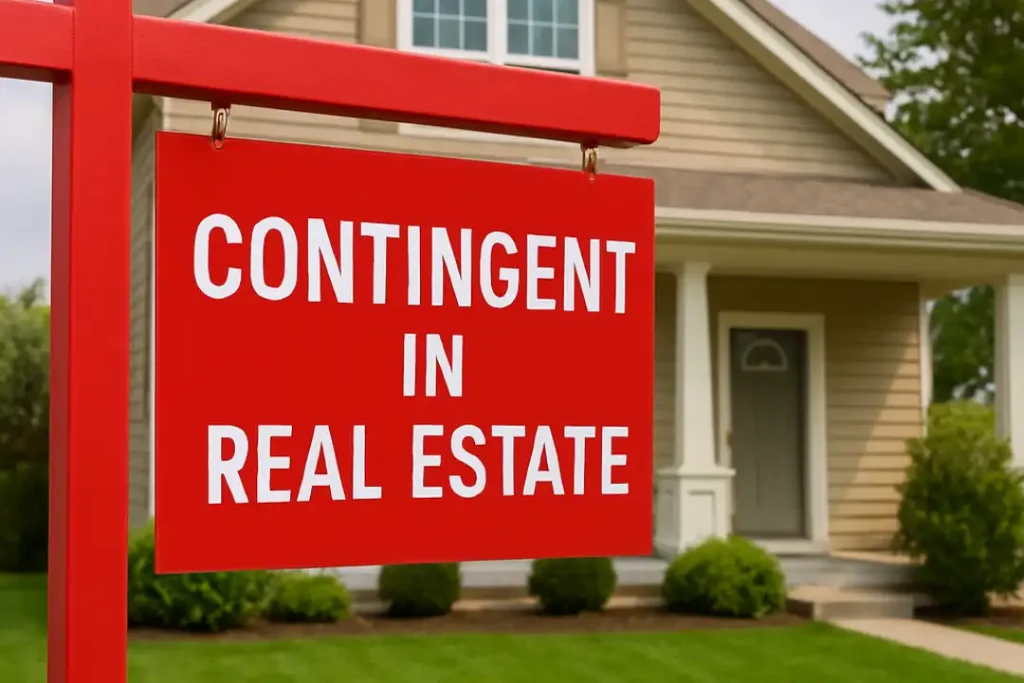In the fast-paced and high-stakes world of commercial real estate, understanding the term “contingent” is crucial for everyone involved in a transaction. While often associated with residential real estate, contingencies play a major role in commercial deals as well, shaping how contracts are negotiated, reviewed, and executed.
Table of Contents
ToggleWhat Does Contingent Mean in Commercial Real Estate?
In commercial real estate, a property marked as “contingent” means a buyer and seller have agreed on terms, but the deal hinges on specific conditions being met. These conditions are known as contingencies, and they must be fulfilled (or waived) before a transaction can proceed to closing.
Unlike residential transactions, commercial deals often involve more complex contingencies that reflect the property’s financial performance, zoning, lease agreements, and environmental status. Each contingency is designed to protect the buyer, giving them a structured exit option if key elements of the deal don’t align with expectations or due diligence findings.
Common Types of Contingencies in Commercial Real Estate
1. Financing Contingency
This gives the buyer time to secure financing. If they cannot obtain a loan under acceptable terms, they can exit the contract without losing their deposit. Commercial loans often involve multiple layers of lender review, making this a vital clause.
2. Due Diligence or Inspection Contingency
Buyers may inspect building systems, review current leases, tenant payment histories, zoning regulations, and conduct Phase I environmental assessments. If any issues arise, the buyer may renegotiate or cancel the agreement.
3. Appraisal Contingency
This ensures the property appraises at or above the purchase price. If the appraisal comes in low, lenders might not finance the full amount, giving the buyer the right to renegotiate or walk away.
4. Title Contingency
Allows the buyer to ensure the title is free of liens, disputes, or easements that could impact ownership. Any issues found during the title search must be resolved before closing.
5. Lease Review Contingency
In investment properties, buyers often include a contingency to review current leases. If tenant terms are unfavorable or financially unstable, the buyer may cancel or renegotiate.
Contingent vs. Pending: Key Differences
- Contingent means the sale is under contract but pending the fulfillment of certain conditions.
- Pending means all contingencies have been satisfied or waived, and the deal is heading toward closing.
In commercial listings, these terms help brokers and investors determine how likely it is that a property will become available again. A “contingent” property may still accept backup offers, especially in complex deals where contingencies can fail.
Strategic Use of Contingencies in Commercial Deals
For Buyers: Contingencies offer necessary protections. Structure them carefully during contract negotiations to ensure due diligence, loan approval, and lease review windows are sufficient.
For Sellers: Evaluate the number and type of contingencies in each offer. Fewer contingencies may mean a faster, less risky closing. Be open to backup offers in case contingencies in the primary deal aren’t met.
What Happens If Contingencies Aren’t Met?
If a contingency is not fulfilled:
- The buyer can typically cancel the contract without penalty
- The seller can re-list the property or accept a backup offer
- Parties may renegotiate terms (e.g., price reductions due to inspection findings)

Can You Make an Offer on a Contingent Commercial Property?
Yes. Submitting a backup offer positions you as the next in line if the current deal falls through. Make your backup offer competitive by minimizing your own contingencies and demonstrating strong financials.
Final Thoughts
Contingencies in commercial real estate serve as essential risk management tools for all parties involved. Whether you’re investing in a retail center, warehouse, or office space, understanding and navigating these clauses is key to a successful transaction. Always consult experienced professionals to craft terms that protect your position without jeopardizing the deal.
Need Expert Help Navigating Contingent Commercial Deals?
At Raphael Collazo Real Estate Services, we specialize in guiding investors and property owners through complex commercial transactions. Reach out today to gain an edge in Louisville’s competitive market.
FAQs:
1. What is a contingency in commercial real estate?
A contingency is a contract clause that makes a sale dependent on certain conditions being met, such as financing, inspections, or lease reviews.
2. Can a buyer back out of a commercial deal due to unmet contingencies?
Yes. If contingencies aren’t fulfilled, buyers usually have the right to cancel the contract without penalty and recover their earnest money.
3. How long is the contingency period in commercial real estate?
It varies based on negotiations but typically ranges from 30 to 90 days, depending on the complexity of due diligence or financing processes.
4. Are commercial contingencies more complex than residential ones?
Yes. Commercial deals often involve added layers of review, including financial audits, tenant leases, zoning, and environmental studies.
5. Can a seller accept other offers during the contingency period?
Yes, especially if the deal is marked “Contingent – Continue to Show.” Backup offers can be considered if the current buyer fails to meet contingency terms.

